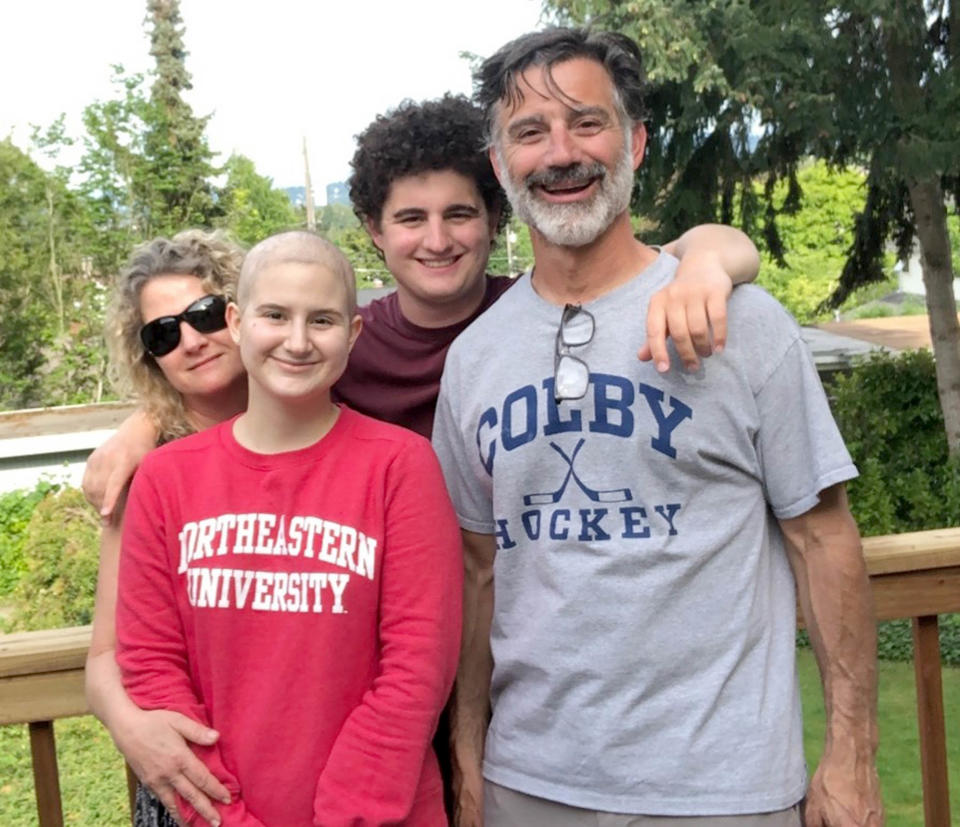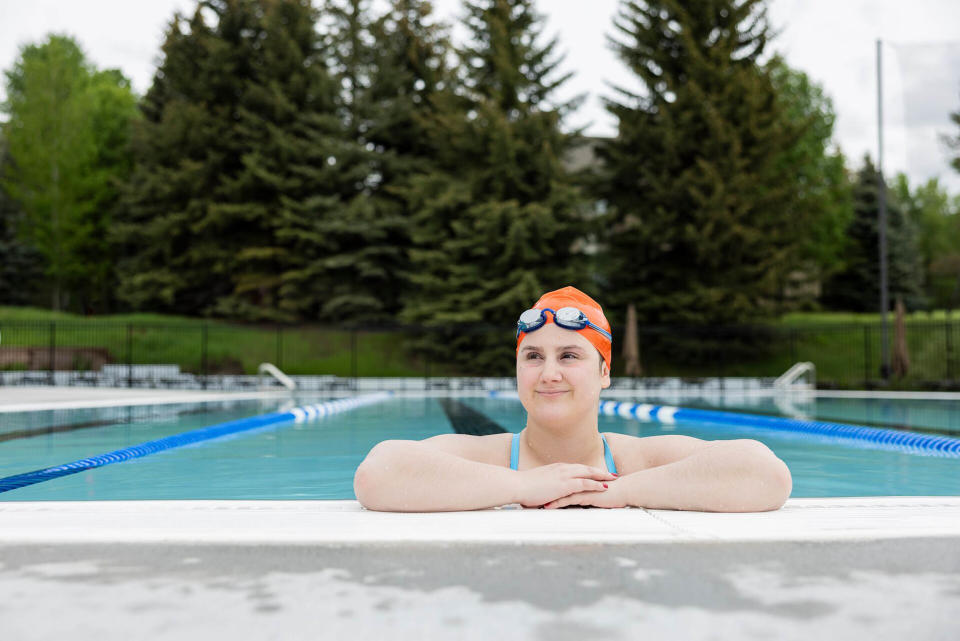A college student had a fever of 104. It was aggressive cancer that risked her fertility
As a first-year student college student in Boston, Faye Prekeges, then 19, had a slight fever after experiencing body aches and headaches for a few days. When her temperature spiked to 104 degrees, she visited the emergency room.
“(The doctors) did some blood tests,” Prekeges, now 22, tells TODAY.com. “They just said they were going to keep me overnight because my white blood cell count was low.”

When her parents arrived, she learned what caused her symptoms: She had an aggressive type of leukemia. Being diagnosed with cancer at the start of her college years felt stunning.
“It’s like a rod going through your nervous system, like every part of your body is freezing cold, but then every nerve is on fire,” she says. “You could probably call it shock, like true actual shock.”
Diagnosis, treatment and hope for the future
After being diagnosed with acute lymphoblastic leukemia (ALL) in February 2020, Prekeges planned on moving her treatment to Seattle Children’s, which is closer to her home in Sun Valley, Idaho. But her state of her health and the onset of the COVID-19 pandemic meant she stayed in the hospital in Boston for a month.
“(ALL) has a really quick onset. By the time I got to the hospital, my bone marrow was 90% leukemia cells,” she says. “I probably had like a handful of days of getting to the hospital before dying.”
ALL “is one of the most common pediatric and adolescent, young adult cancers that we see,” Dr. Tyler Ketterl, a doctor involved in Prekeges’ care, tells TODAY.com. It’s a cancer that starts in the bone marrow and impacts the white blood cells, he notes, and treatment involves chemotherapy or bone marrow transplant.
Doctors in Boston worried about transferring Prekeges via plane during the early days of the pandemic and began treatment to bolster her health for the flight.
“They kept me in a little longer just to make sure I would be stable,” she says. “They didn’t want a plane to have to land somewhere they didn’t know what was going on with COVID in that place.”
While in the Boston hospital, she underwent IV chemotherapy a few times a week and chemotherapy into her spine through a lumbar puncture. When she arrived in Seattle, she started outpatient chemotherapy four days a week and lumbar punctures for chemotherapy to her spine.
“I really just felt horrible because (I was) getting (chemotherapy) every day, and that’s when my hair completely finally fell out,” she says. “I had a neurological reaction to one of the chemotherapies, so there were three or four instances where it looked and sounded like I was having an aneurysm or stroke, but I wasn’t.”

The treatment put Prekeges into remission, but doctors believed her to be high risk for the aggressive cancer to recur, so she needed to undergo a bone marrow transplant. But before that, she’d need a high dose of chemotherapy and radiation, which would likely make her infertile. While Prekeges wasn’t thinking about a future family, her mom asked. The typical fertility preservation for female cancer patients is egg harvesting, which requires stopping treatment for multiple weeks, but Prekeges didn’t have that kind of time.
Still, the doctors were able to offer her some hope.
“There had been a new procedure that was really recently out of the experimental stage,” she says. “I was super lucky. … I was the first patient.”
Childhood cancers and quality of life
As cancer treatments have improved, patients with childhood and adolescent cancers are surviving longer and longer. That also means doctors need to navigate how to provide therapies that give young people the best outcomes without too many lingering side effects.
“Our goal is that these children survive a cancer diagnosis and live long healthy lives,” Ketterl, medical director of Seattle Children’s adolescent and young adult oncology and fertility care and preservation programs, tells TODAY.com. “We’re constantly striving for less toxic therapies … to try and limit these lasting, permanent impacts.”
As a result, some doctors treating cancer in young people are shifting to make fertility preservation more of a priority.
“I started to get emails from parents saying, ‘My child is in their early 20s and is showing signs of menopause,’ or, ‘My child is now 20 or so and is interested in starting a family and we’re just now learning they're infertile, and we didn’t know this was possible,” Ketterl says. “I didn’t feel like it was an acceptable outcome of cancer.”
For patients, like Prekeges, whose treatment can't be paused without jeopardizing their remission, a new procedure, ovarian tissue cryopreservation, may offer some hope.
To perform it, Ketterl explains, the ovary is removed while the patient is in remission, and then the ovarian cortex, where the eggs are located, is removed from the ovary and cut into strips, which are preserved. When the patient wants to pursue pregnancy, the strips are implanted into the abdomen. The ovarian tissue should then start functionally normally again and produce hormones that allow the eggs to be fertilized.
Patients whose cancer impacts the ovaries or who require so much treatment before remission that they're already infertile cannot undergo the procedure, Ketterl says, adding that cost can be limiting for many who wish to undergo fertility preservation of any kind.

“This is one of the really hard things about fertility preservation — there is no national mandate for insurance companies to cover (it),” Ketterl says. “It really can limit who has access."
Some states have legislation facilitating coverage for fertility preservation, but Congress has yet to pass anything at the national level.
Returning to college
Prekeges had her ovary removed while she was undergoing a prep surgery for her transplant, which was successful. Having cancer at the height of the COVID-19 pandemic and during what should have been a fun first year of college felt overwhelming at times. Then, the former competitive swimmer gave herself a pep talk.
“I was kind of sad, but then I was like, ‘OK, we’re not going to die. You’re going to do it. It’s going to suck, but you’re doing to get through that,’” she says. “That is kind of the same attitude I would have during (swim) practice, which is like, ‘This kind of sucks … but you’re not going to just stop in the middle of the pool.’”
Knowing that her experience with cancer had an end helped her cope. The support of friends, family and the local community also kept her encouraged. Prekeges is cancer free but won’t be considered fully cleared until she is cancer free for 10 years.
Since her experience, she’s learned that asking for and accepting help makes grappling with cancer easier.
“It’s OK to relinquish the sliver of independence you got and go back to being a kid for a couple of years while you’re getting treatment,” she says. “My experience itself was easier because I settled on, ‘OK you’re going to fight it.’”
Prekeges returned to college to study French and history at the University of Washington. Following her senior year this school year, she hopes either to pursue a master’s degree or become a teaching assistant in Europe.
Since having cancer, she’s come to understand herself better.
“(I’ve learned) to appreciate not just myself, but also my body and to understand that your body is not an ornament. It’s a tool, and it can do amazing things, and it might screw up and give you cancer,” she says. “Instead of hating your body and hating yourself and feeling down or feeling insecure, just look at yourself and understand that you are possible of withstanding extreme things.”
This article was originally published on TODAY.com

